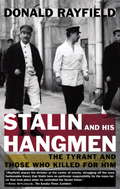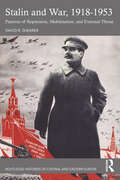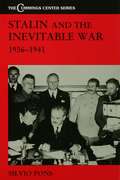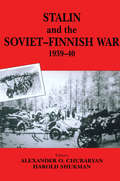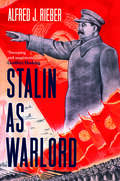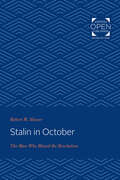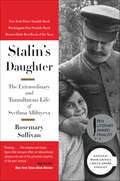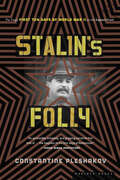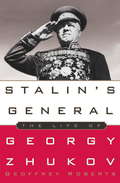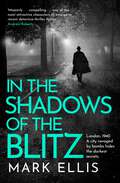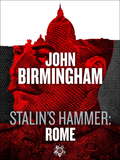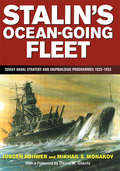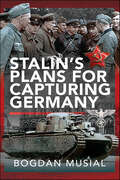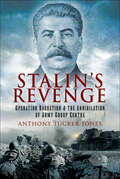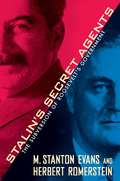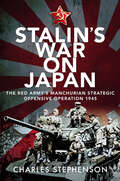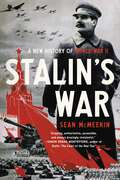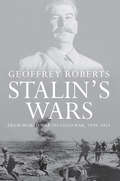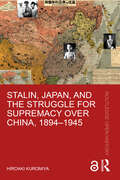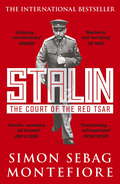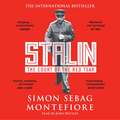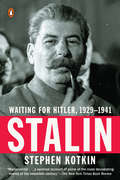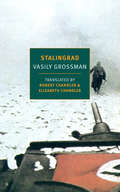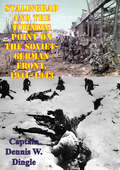- Table View
- List View
Stalin and His Hangmen: The Tyrant and Those Who Killed for Him
by Donald RayfieldStalin did not act alone. The mass executions, the mock trials, the betrayals and purges, the jailings and secret torture that ravaged the Soviet Union during the three decades of Stalin's dictatorship, were the result of a tight network of trusted henchmen (and women), spies, psychopaths, and thugs. At the top of this pyramid of terror sat five indispensable hangmen who presided over the various incarnations of Stalin's secret police. Now, in his harrowing new book, Donald Rayfield probes the lives, the minds, the twisted careers, and the unpunished crimes of Stalin's loyal assassins. Founded by Feliks Dzierzynski, the Cheka-the Extraordinary Commission-came to life in the first years of the Russian Revolution. Spreading fear in a time of chaos, the Cheka proved a perfect instrument for Stalin's ruthless consolidation of power. But brutal as it was, the Cheka under Dzierzynski was amateurish compared to the well-oiled killing machines that succeeded it. Genrikh Iagoda's OGPU specialized in political assassination, propaganda, and the manipulation of foreign intellectuals. Later, the NKVD recruited a new generation of torturers. Starting in 1938, terror mastermind Lavrenti Beria brought violent repression to a new height of ingenuity and sadism. As Rayfield shows, Stalin and his henchmen worked relentlessly to coerce and suborn leading Soviet intellectuals, artists, writers, lawyers, and scientists. Maxim Gorky, Aleksandr Fadeev, Alexei Tolstoi, Isaak Babel, and Osip Mandelstam were all caught in Stalin's web-courted, toyed with, betrayed, and then ruthlessly destroyed. In bringing to light the careers, personalities, relationships, and "accomplishments" of Stalin's key henchmen and their most prominent victims, Rayfield creates a chilling drama of the intersection of political fanaticism, personal vulnerability, and blind lust for power spanning half a century. Though Beria lost his power-and his life-after Stalin's death in 1953, the fundamental methods of the hangmen maintained their grip into the second half of the twentieth century. Indeed, Rayfield argues, the tradition of terror, far from disappearing, has emerged with renewed vitality under Vladimir Putin. Written with grace, passion, and a dazzling command of the intricacies of Soviet politics and society, Stalin and the Hangmen is a devastating indictment of the individuals and ideology that kept Stalin in power.
Stalin and War, 1918-1953: Patterns of Repression, Mobilization, and External Threat (Routledge Histories of Central and Eastern Europe)
by David R. ShearerStalin and War, 1918-1953 is the first book to examine the patterns of radicalized internal violence that characterized the Stalinist regime across the whole of the dictator’s rule, and it is one of the only works to connect patterns of internal violence to the dictator’s perceptions of war and foreign threat. Discussion focuses on the crisis years 1928-1932, 1936-1939, the Great Fatherland War, and the last war crisis period, 1947-1953. Violent repressions under Stalin were cyclical. They peaked and ebbed but, in each case, they were linked to Stalin’s expectation of war and invasion, to his perceived need for urgent internal mobilization, and to intense foreign policy activity. Stalin’s behavior in each of these perceived war crises followed a pattern established during the dictator's experience as a military commander in the Russian revolutionary wars, and especially during the Polish war in 1919 and 1920. Together, these chapters trace a consistent and interconnected logic of war and repression throughout Stalin’s political life. This book will be of interest to professional scholars of Soviet history, twentieth-century history, and World War II history, and it is approachable enough to be appreciated by general readers.
Stalin and the Inevitable War, 1936-1941
by Silvio PonsThis is a study of the responses of the Soviet Union to the European crises which led to World War II. It is based on a substantial body of political and diplomatic documents that has become accessible to scholars since the opening up of former Soviet archives in 1992.
Stalin and the Soviet-Finnish War, 1939-1940 (Soviet (Russian) Study of War)
by E. N. Kulkov O. A. RzheshevskyThis is the verbatim record of a secret and hitherto unpublished meeting, held in the Kremlin in April 1940, devoted to a post mortem of the Finnish campaign.
Stalin as Warlord
by Alfred J. RieberAn authoritative account of Stalin as a wartime leader—showing how his paradoxical policies of mass mobilization and repression affected all aspects of Soviet society The Second World War was the defining moment in the history of the Soviet Union. With Stalin at the helm, it emerged victorious at a huge economic and human cost. But even before the fighting had ended, Stalin began to turn against the architects of success. In this original and comprehensive study, Alfred J. Rieber examines Stalin as a wartime leader, arguing that his policies were profoundly paradoxical. In preparation for the war, Stalin mobilized the whole of Soviet society in pursuit of his military goals and intensified the centralization of his power. Yet at the same time, his use of terror weakened the forces vital to the defense of the country. In his efforts to rebuild the country after the devastating losses and destruction, he suppressed groups that had contributed immeasurably to victory. His steady, ruthless leadership cultivated a legacy that was to burden the Soviet Union and Russia to the present day.
Stalin in October: The Man Who Missed the Revolution
by Robert M. SlusserOriginally published in 1987. In March 1917 young Joseph Stalin, already a high-ranking Bolshevik, returned from Siberian exile in search of greatness and power. But his activities during the months leading up to the October Revolution were full of blunders and misjudgments—failures that in later years Stalin obliterated from the historical record. Stalin in October reassembles the history of 1917 and explains why, on the eve of the revolutionaries' seizure of power, Stalin seemingly dropped out of the picture. "He would always be dogged," Slusser writes, "by a nagging sense of having somehow missed the revolution." The lingering shame was crucial to Stalin's development into a Soviet dictator.
Stalin's Daughter: The Extraordinary and Tumultuous Life of Svetlana Alliluyeva
by Rosemary SullivanWinner of the Plutarch Award for Best BiographyNational Book Critics Circle Award FinalistPEN Literary Award FinalistNew York Times Notable BookWashington Post Notable BookBoston Globe Best Book of the YearThe award-winning author of Villa Air-Bel returns with a painstakingly researched, revelatory biography of Svetlana Stalin, a woman fated to live her life in the shadow of one of history’s most monstrous dictators—her father, Josef Stalin.Born in the early years of the Soviet Union, Svetlana Stalin spent her youth inside the walls of the Kremlin. Communist Party privilege protected her from the mass starvation and purges that haunted Russia, but she did not escape tragedy—the loss of everyone she loved, including her mother, two brothers, aunts and uncles, and a lover twice her age, deliberately exiled to Siberia by her father.As she gradually learned about the extent of her father’s brutality after his death, Svetlana could no longer keep quiet and in 1967 shocked the world by defecting to the United States—leaving her two children behind. But although she was never a part of her father’s regime, she could not escape his legacy. Her life in America was fractured; she moved frequently, married disastrously, shunned other Russian exiles, and ultimately died in poverty in Wisconsin.With access to KGB, CIA, and Soviet government archives, as well as the close cooperation of Svetlana’s daughter, Rosemary Sullivan pieces together Svetlana’s incredible life in a masterful account of unprecedented intimacy. Epic in scope, it’s a revolutionary biography of a woman doomed to be a political prisoner of her father’s name. Sullivan explores a complicated character in her broader context without ever losing sight of her powerfully human story, in the process opening a closed, brutal world that continues to fascinate us.Illustrated with photographs.
Stalin's Folly: The Tragic First Ten Days of Word War II on the Eastern Front
by Constantine PleshakovOn June 22, 1941, radios all over the Soviet Union crackled with the announcement that the country had been attacked by Nazi Germany. But the voice on the airwaves was not the familiar one of Joseph Stalin; it was the voice of his deputy, Molotov. Paralyzed by Hitler's unexpected move, Stalin disappeared completely from public view for the crucial ten days of war on the Eastern Front. In this taut, hour-by-hour account, Constantine Pleshakov draws on a wealth of information from newly opened archives to elucidate the complex causes of the Soviet leader's reaction, revealing the feared despot's unrealized military stratagems as well as his personal vulnerabilities, while also offering a new and deeper understanding of Russian history.
Stalin's General: The Life of Georgy Zhukov
by Geoffrey RobertsWidely regarded as the most accomplished general of World War II, the Soviet military legend Marshal Georgy Zhukov at last gets the full-scale biographical treatment he has long deserved. A man of indomitable will and fierce determination, Georgy Zhukov was the Soviet Union's indispensable commander through every one of the critical turning points of World War II. It was Zhukov who saved Leningrad from capture by the Wehrmacht in September 1941, Zhukov who led the defense of Moscow in October 1941, Zhukov who spearheaded the Red Army's march on Berlin and formally accepted Germany's unconditional surrender in the spring of 1945. Drawing on the latest research from recently opened Soviet archives, including the uncensored versions of Zhukov's own memoirs, Roberts offers a vivid portrait of a man whose tactical brilliance was matched only by the cold-blooded ruthlessness with which he pursued his battlefield objectives. After the war, Zhukov was a key player on the geopolitical scene. As Khrushchev's defense minister, he was one of the architects of Soviet military strategy during the Cold War. While lauded in the West as a folk hero--he was the only Soviet general ever to appear on the cover of Time magazine--Zhukov repeatedly ran afoul of the Communist political authorities. Wrongfully accused of disloyalty, he was twice banished and erased from his country's official history--left out of books and paintings depicting Soviet World War II victories. Piercing the hyperbole of the Zhukov personality cult, Roberts debunks many of the myths that have sprung up around Zhukov's life and career to deliver fresh insights into the marshal's relationships with Stalin, Khrushchev, and Eisenhower. A remarkably intimate portrait of a man whose life was lived behind an Iron Curtain of official secrecy, Stalin's General is an authoritative biography that restores Zhukov to his rightful place in the twentieth-century military pantheon.From the Hardcover edition.e was lived behind an Iron Curtain of official secrecy, Stalin's General is a full, fair, and authoritative biography that restores Zhukov to his rightful place in the twentieth-century military pantheon.From the Hardcover edition.
Stalin's Gold: A deeply captivating classic crime thriller (The DCI Frank Merlin Series #3)
by Mark EllisVividly atmospheric and brimming with suspense, Mark Ellis presents this insanely captivating wartime thriller of classic espionage.The second instalment in the Frank Merlin Series, following on from Princes Gate.PRAISE FOR THE CRTICALLY ACCALIMED DCI FRANK MERLIN SERIES:'A richly atmospheric, authentic, and suspenseful detective series' - Joseph Finder, New York Times bestselling author'So immaculately nuanced they genuinely feel like they belong in the cannon of mid-20th century thrillers . . . Another belter!' - Fiona Phillips'A truly spellbinding page turner that keeps you hooked right to the end' - Dorset Book Detective'Brimming with action . . . complex, addictive and highly entertaining . . . I cannot wait to read more books by Mark Ellis' - The Book Cosy Book Club'Brimming with authentic details . . . A compelling tale of crime fiction' - Foreword Reviews'A mammoth read with a Dickensian plethora of characters that I thoroughly enjoyed immersing myself in . . . meticulously researched . . . deliciously complex' - CARAMEROLLOVESBOOKS___________December 1938. Moscow. Josef Stalin has lost some gold. He is not a happy man. He asks his henchman Beria to track it down. September 1940 London. Above the city the Battle of Britain rages and the bombs rain down. On the streets below, DCI Frank Merlin and his officers investigate the sudden disappearance of Polish RAF pilot Ziggy Kilinski while also battling an epidemic of looting unleashed by the chaos and destruction of the Blitz. Kilinski's fellow pilots, a disgraced Cambridge don, Stalin's spies in London, members of the Polish government in exile and a ruthless Russian gangster are amongst those caught up in Merlin's enquiries. Sweeping from Stalin's Russia to Civil War Spain, from Aztec Mexico to pre-war Poland, and from Hitler's Berlin to Churchill's London a compelling story of treasure, grand larceny, treachery, torture and murder unfolds. Eventually as Hitler reluctantly accepts that the defiance of the RAF has destroyed his chances of invasion for the moment, a violent shoot-out in Hampstead leads Merlin on the final truth....and Stalin to his gold. ___________And don't forget the other titles in the highly praised DCI Frank Merlin series: Princess Gate, Merlin at War and A Death In Mayfair.
Stalin's Gold: A deeply captivating classic crime thriller (The\dci Frank Merlin Ser. #2)
by Mark EllisVividly atmospheric and brimming with suspense, Mark Ellis presents this insanely captivating wartime thriller of classic espionage.The second instalment in the Frank Merlin Series, following on from Princes Gate.PRAISE FOR THE CRTICALLY ACCALIMED DCI FRANK MERLIN SERIES:'A richly atmospheric, authentic, and suspenseful detective series' - Joseph Finder, New York Times bestselling author'So immaculately nuanced they genuinely feel like they belong in the cannon of mid-20th century thrillers . . . Another belter!' - Fiona Phillips'A truly spellbinding page turner that keeps you hooked right to the end' - Dorset Book Detective'Brimming with action . . . complex, addictive and highly entertaining . . . I cannot wait to read more books by Mark Ellis' - The Book Cosy Book Club'Brimming with authentic details . . . A compelling tale of crime fiction' - Foreword Reviews'A mammoth read with a Dickensian plethora of characters that I thoroughly enjoyed immersing myself in . . . meticulously researched . . . deliciously complex' - CARAMEROLLOVESBOOKS___________December 1938. Moscow. Josef Stalin has lost some gold. He is not a happy man. He asks his henchman Beria to track it down. September 1940 London. Above the city the Battle of Britain rages and the bombs rain down. On the streets below, DCI Frank Merlin and his officers investigate the sudden disappearance of Polish RAF pilot Ziggy Kilinski while also battling an epidemic of looting unleashed by the chaos and destruction of the Blitz. Kilinski's fellow pilots, a disgraced Cambridge don, Stalin's spies in London, members of the Polish government in exile and a ruthless Russian gangster are amongst those caught up in Merlin's enquiries. Sweeping from Stalin's Russia to Civil War Spain, from Aztec Mexico to pre-war Poland, and from Hitler's Berlin to Churchill's London a compelling story of treasure, grand larceny, treachery, torture and murder unfolds. Eventually as Hitler reluctantly accepts that the defiance of the RAF has destroyed his chances of invasion for the moment, a violent shoot-out in Hampstead leads Merlin on the final truth....and Stalin to his gold. ___________And don't forget the other titles in the highly praised DCI Frank Merlin series: Princess Gate, Merlin at War and A Death In Mayfair.
Stalin's Hammer: Rome (An Axis of Time Novella)
by John BirminghamAlternate history master John Birmingham unleashes an astounding new installment in his Axis of Time series: an original eBook novella that begins when the future and the past collide. The year is 1955, ten years after a battle fleet from 2021 exploded through a wormhole in space--straight into the Battle of Midway. A staggered, war-torn world catches its balance. Uptimers, with their extraordinary technology and strange styles, mingle with the real timers. Universities study the effects on the future. And men like Prince Harry of England find themselves playing pivotal roles in a history that has already happened. Or has it? In the starkly partitioned city of Rome, spies, killers, and mafia foot soldiers cross the dividing line between Allied and Russian Zones. Somewhere in the ancient, underground catacombs two men hunt for one another. One is Stalin's personal assassin, the other a murderous, disillusioned acolyte of the Communist ideal, allied by fate and history with the OSS, MI6, and England's swashbuckling Prince Harry. Harry's own mission takes him to a glittering dinner party and a prize over which the two Russian killers are fighting--a factory owner with a terrifying secret. As the forces of West and East are locked in a stalemate, what this man knows could change everything: Josef Stalin, hiding in a Siberian bunker, is ready to hit the world with a thunderous blow.
Stalin's Ocean-going Fleet: Soviet Naval Strategy and Shipbuilding Programs, 1935-53 (Cass Series: Naval Policy and History)
by Jurgen Rohwer Mikhail MonakovA study of the development of strategic concepts in Stalin's Navy, in the context of his foreign/defence policy, using original archival documents translated from the Russian.
Stalin's Plans for Capturing Germany
by Bogdan MusialDrawing on a host of internal Soviet Politburo discussions, memoranda and speeches, this book shows that the Soviet Union was a heavily militarized state that incessantly planned to unleash a great, ideologically motivated war. While the myth of Soviet benevolence has now largely been discredited, the idea that Stalin’s Soviet Union was a peaceful power that sought to prevent the war through all kinds of means – including an ill-fated non-aggression treaty with Hitler – remains popular to this day. Indeed, this narrative is not only promoted by Putin's propaganda but also by a host of Western intellectuals and even historians who take public declarations at face value. Drawing on a host of internal Soviet Politburo discussions, memoranda and speeches, this book shows that the Soviet Union was a heavily militarized state that incessantly planned to unleash a great, ideologically motivated war against the rest of the world. In fact, its entire political life revolved around the question of war, especially following the onset of the Great Depression in 1929, which convinced Soviet leaders of the imminent collapse of the capitalist system abroad. Thus, both the collectivization as well as the terror that followed in its wake were done with the coming war in mind – even though there was no tangible danger of war. Slowed down by countless devastating setbacks, Stalin was nevertheless able to amass a gigantic army by the late 1930s. When Hitler approached Stalin in 1939 asking for Soviet neutrality in his planned invasion of Poland, Stalin sensed a golden opportunity: by supporting Hitler, he could turn the European powers against each another, allowing him to intervene once they were sufficiently weakened. However, Stalin miscalculated: Hitler beat both Poland and France in less than a year and then turned against Moscow in 1941, long before Stalin was ready for his own attack.
Stalin's Revenge: Operation Bagration & the Annihilation of Army Group Centre
by Anthony Tucker-JonesIn the summer of 1944 the Red Army crushed Army Group Centre in one of the largest offensives in military history. Operation Bagration - launched almost exactly three years after the Nazi invasion of the Soviet Union - was Stalin's retribution for Hitler's Operation Barbarossa. Earlier battles at Stalingrad and Kursk paved the way for Soviet victory, but as Anthony Tucker-Jones demonstrates in this fascinating study, Bagration ensured that the Germans would never regain the strategic initiative. In one fell swoop the Wehrmacht lost a quarter of its strength on the Eastern Front. And in a series of overwhelming assaults, the Red Army recaptured practically all the territory the Soviet Union had lost in 1941, advanced into East Prussia and reached the outskirts of Warsaw. As he reconstructs this massive and complex battle, Anthony Tucker-Jones assesses the opposing forces and their commanders and gives a vivid insight into the planning and decision-making at the highest level. He recreates the experience of the soldiers on the battlefield by using graphic contemporary accounts, and he sets the Bagration offensive in the wider context of the Soviet war effort. He also asks why Stalin's road to retribution proved to be such a long and bloody one - for the Germans, despite their crippling losses, managed to resist for another ten months.
Stalin's Secret Agents: The Subversion of Roosevelt's Government
by M. Stanton Evans Herbert RomersteinUntil now, many sinister events that transpired in the clash of the world’s superpowers at the close of World War II and the ensuing Cold War era have been ignored, distorted, and kept hidden from the public. Through a meticulous examination of primary sources and disclosure of formerly secret records, this riveting account of the widespread infiltration of the federal government by Stalin’s “agents of influence” and the damage they inflicted will shock readers. Focusing on the wartime conferences of Teheran and Yalta, veteran journalist M. Stanton Evans and intelligence expert Herbert Romerstein, the former head of the U.S. Office to Counter Soviet Disinformation, draw upon years of research and a meticulous examination of primary sources to trace the vast deception that kept Stalin’s henchmen on the federal payroll and sabotaged policy overseas in favor of the Soviet Union. While FDR’s health and mental capacities weakened, aides such as Lauchlin Currie and Harry Hopkins exerted pro-Red influence on U.S. policy—leading to massive breaches of internal security and the betrayal of free-world interests. Along with revealing the extent to which the Soviet threat was obfuscated or denied, this in-depth analysis exposes the rigging of at least two grand juries and the subsequent multilayered cover-up to protect those who let the infiltration happen. Countless officials of the Roosevelt and Truman administrations turned a blind eye to the penetration problem. The documents and facts presented in this thoroughly researched exposé indict in historical retrospect the people responsible for these corruptions of justice.
Stalin's War on Japan: The Red Army's Manchurian Strategic Offensive Operation, 1945
by Charles StephensonThis WWII military study examines the critical yet overlooked Soviet offensive on Japan&’s puppet state and its influence on winning the Pacific War. Did Japan surrender in 1945 because the Americans dropped atomic bombs on Hiroshima and Nagasaki? Or because of the crushing defeat inflicted by the Soviet Union in Manchukuo, the Japanese puppet state in north-east China? In Stalin&’s War on Japan, Charles Stephenson describes the Soviet offensive from the top-level decision-making and early planning stages to its decisive outcome on the ground. He also considers to what extent Japan&’s capitulation is attributable to the atomic bomb or the stunningly successful entry of the Soviet Union into the conflict. Stephenson combines a vividly detailed narrative of the invasion itself with an absorbing account of the political and diplomatic process that gave rise to the offensive—with particular focus on the Yalta conference. There, Stalin allowed the Americans to persuade him to join the war in the east; a conflict he was determined on entering anyway. Stalin&’s War on Japan sheds new light on the last act of the Second World War.
Stalin's War: A New History of World War II
by Sean McMeekinA prize-winning historian reveals how Stalin—not Hitler—was the animating force of World War II in this major new history.We remember World War II as a struggle between good and evil, with Hitler propelling events and the Allied powers saving the day. But Hitler's armies did not fight in multiple theaters, his empire did not span the Eurasian continent, and he did not inherit the spoils of war. That role belonged to Joseph Stalin. Hitler's genocidal ambition may have unleashed Armageddon, but as celebrated historian Sean McMeekin shows, the conflicts that emerged were the result of Stalin's maneuverings, orchestrated to unleash a war between capitalist powers in Europe and between Japan and the Anglo-American forces in the Pacific. Meanwhile, the United States and Britain's self-defeating strategy of supporting Stalin and his armies at all costs allowed the Soviets to conquer most of Eurasia, from Berlin to Beijing, for Communism.A groundbreaking reassessment, Stalin's War is essential reading for anyone looking to understand the roots of the current world order.
Stalin's Wars: From World War to Cold War, 1939-1953
by Geoffrey RobertsThis breakthrough book provides a detailed reconstruction of Stalin's leadership from the outbreak of the Second World War in 1939 to his death in 1953. Making use of a wealth of new material from Russian archives, Geoffrey Roberts challenges a long list of standard perceptions of Stalin: his qualities as a leader; his relationships with his own generals and with other great world leaders; his foreign policy; and his role in instigating the Cold War. While frankly exploring the full extent of Stalin's brutalities and their impact on the Soviet people, Roberts also uncovers evidence leading to the stunning conclusion that Stalin was both the greatest military leader of the twentieth century and a remarkable politician who sought to avoid the Cold War and establish a long-term detente with the capitalist world. By means of an integrated military, political, and diplomatic narrative, the author draws a sustained and compelling personal portrait of the Soviet leader. The resulting picture is fascinating and contradictory, and it will inevitably change the way we understand Stalin and his place in history. Roberts depicts a despot who helped save the world for democracy, a personal charmer who disciplined mercilessly, a utopian ideologue who could be a practical realist, and a warlord who undertook the role of architect of post-war peace.
Stalin, Japan, and the Struggle for Supremacy over China, 1894–1945 (Routledge Open History)
by Hiroaki KuromiyaStalin was a master of deception, disinformation, and camouflage, by means of which he gained supremacy over China and defeated imperialism on Chinese soil. This book examines Stalin’s covert operations in his hunt for supremacy. By the late 1920s Britain had ceded place to Japan as Stalin’s main enemy in Asia. By seducing Japan deeply into China, Stalin successfully turned Japan’s aggression into a weapon of its own destruction. The book examines Stalin’s covert operations from the murder of the Manchurian warlord Zhang Zuolin in 1928 and the publication of the forged “Tanaka Memorial” in 1929, to Stalin’s hidden role in Japan’s invasion of Manchuria in 1931, the outbreak of all-out war between China and Japan in 1937, and Japan’s defeat in 1945. In the shadow of these and other events we find Stalin and his secret operatives, including many Chinese and Japanese collaborators, most notably Zhang Xueliang and Kōmoto Daisaku, the self-professed assassin of Zhang Zuolin. The book challenges accounts of the turbulent history of inter-war East Asia that have ignored or minimized Stalin’s presence and instead exposes and analyzes Stalin’s secret modus operandi, modernized as “hybrid war” in today’s Russia. The book is essential for students and specialists of Stalin, China, the Soviet Union, Japan, and East Asia.
Stalin: The Court of the Red Tsar
by Simon Sebag MontefioreWinner of the British Book Awards History Book of the YearLonglisted for the Samuel Johnson PrizeThis thrilling biography of Stalin and his entourage during the terrifying decades of his supreme power transforms our understanding of Stalin as Soviet dictator, Marxist leader and Russian tsar. Based on groundbreaking research, Simon Sebag Montefiore reveals in captivating detail the fear and betrayal, privilege and debauchery, family life and murderous cruelty of this secret world. Written with extraordinary narrative verve, this magnificent feat of scholarly research has become a classic of modern history writing. Showing how Stalin's triumphs and crimes were the product of his fanatical Marxism and his gifted but flawed character, this is an intimate portrait of a man as complicated and human as he was brutal and chilling.
Stalin: The Court of the Red Tsar
by Simon Sebag MontefioreWinner of the British Book Awards History Book of the YearLonglisted for the Samuel Johnson PrizeThis thrilling biography of Stalin and his entourage during the terrifying decades of his supreme power transforms our understanding of Stalin as Soviet dictator, Marxist leader and Russian tsar. Based on groundbreaking research, Simon Sebag Montefiore reveals in captivating detail the fear and betrayal, privilege and debauchery, family life and murderous cruelty of this secret world. Written with extraordinary narrative verve, this magnificent feat of scholarly research has become a classic of modern history writing. Showing how Stalin's triumphs and crimes were the product of his fanatical Marxism and his gifted but flawed character, this is an intimate portrait of a man as complicated and human as he was brutal and chilling.Read by John Nettles(p) 2004 Orion Publishing Group
Stalin: Waiting for Hitler, 1929-1941
by Stephen Kotkin&“Monumental.&” —The New York Times Book ReviewPulitzer Prize-finalist Stephen Kotkin has written the definitive biography of Joseph Stalin, from collectivization and the Great Terror to the conflict with Hitler's Germany that is the signal event of modern world history In 1929, Joseph Stalin, having already achieved dictatorial power over the vast Soviet Empire, formally ordered the systematic conversion of the world&’s largest peasant economy into &“socialist modernity,&” otherwise known as collectivization, regardless of the cost. What it cost, and what Stalin ruthlessly enacted, transformed the country and its ruler in profound and enduring ways. Building and running a dictatorship, with life and death power over hundreds of millions, made Stalin into the uncanny figure he became. Stephen Kotkin&’s Stalin: Waiting for Hitler, 1929–1941 is the story of how a political system forged an unparalleled personality and vice versa. The wholesale collectivization of some 120 million peasants necessitated levels of coercion that were extreme even for Russia, and the resulting mass starvation elicited criticism inside the party even from those Communists committed to the eradication of capitalism. But Stalin did not flinch. By 1934, when the Soviet Union had stabilized and socialism had been implanted in the countryside, praise for his stunning anti-capitalist success came from all quarters. Stalin, however, never forgave and never forgot, with shocking consequences as he strove to consolidate the state with a brand new elite of young strivers like himself. Stalin&’s obsessions drove him to execute nearly a million people, including the military leadership, diplomatic and intelligence officials, and innumerable leading lights in culture. While Stalin revived a great power, building a formidable industrialized military, the Soviet Union was effectively alone and surrounded by perceived enemies. The quest for security would bring Soviet Communism to a shocking and improbable pact with Nazi Germany. But that bargain would not unfold as envisioned. The lives of Stalin and Hitler, and the fates of their respective dictatorships, drew ever closer to collision, as the world hung in the balance. Stalin: Waiting for Hitler, 1929–1941 is a history of the world during the build-up to its most fateful hour, from the vantage point of Stalin&’s seat of power. It is a landmark achievement in the annals of historical scholarship, and in the art of biography.
Stalingrad
by Vasily GrossmanIn April 1942, Hitler and Mussolini meet in Salzburg where they agree on a renewed assault on the Soviet Union. Launched in the summer, the campaign soon picks up speed, as the routed Red Army is driven back to the industrial center of Stalingrad on the banks of the Volga. In the rubble of the bombed-out city, Soviet forces dig in for a last stand. The story told in Vasily Grossman’s Stalingrad unfolds across the length and breadth of Russia and Europe, and its characters include mothers and daughters, husbands and brothers, generals, nurses, political activists, steelworkers, and peasants, along with Hitler and other historical figures. At the heart of the novel is the Shaposhnikov family. Even as the Germans advance, the matriarch, Alexandra Vladimirovna, refuses to leave Stalingrad. Far from the front, her eldest daughter, Ludmila, is unhappily married to the Jewish physicist Viktor Shtrum. Viktor’s research may be of crucial military importance, but he is distracted by thoughts of his mother in the Ukraine, lost behind German lines. In Stalingrad, published here for the first time in English translation, and in its celebrated sequel, Life and Fate, Grossman writes with extraordinary power and deep compassion about the disasters of war and the ruthlessness of totalitarianism, without, however, losing sight of the little things that are the daily currency of human existence or of humanity’s inextinguishable, saving attachment to nature and life. Grossman’s two-volume masterpiece can now be seen as one of the supreme accomplishments of twentieth-century literature, tender and fearless, intimate and epic.
Stalingrad And The Turning Point On The Soviet-German Front, 1941-1943
by Captain Dennis W. DingleThis study is an historical analysis of the Soviet-German conflict during World War II and focuses on the years 1941-1943. It examines the relative economic and military power of the two nations to determine if there was a shift in advantage, or turning point, during that period. To quantify those elements of power, it uses criteria taken from a current strategic analysis model. This model assesses elements of national power to aid in strategic problem solving and international policy formulation. Specific criteria are applied to four specific military events between 1941 and 1943. The resulting data is then graphed to compare relative military and economic power. The graphs serve as the basis for conclusions.Among the conclusions which may be drawn from this study are: the Battle of Stalingrad was not the economic turning point of the war when considering the criteria of industrial labor and armaments production; Stalingrad was the military turning point, considering military forces and equipment on the Soviet-German front.This study concludes that this method of assessing relative national power of nations can be applied in an historical context to evaluate past wars. It may assist historians to better understand the factors that led to various turning points throughout history.
